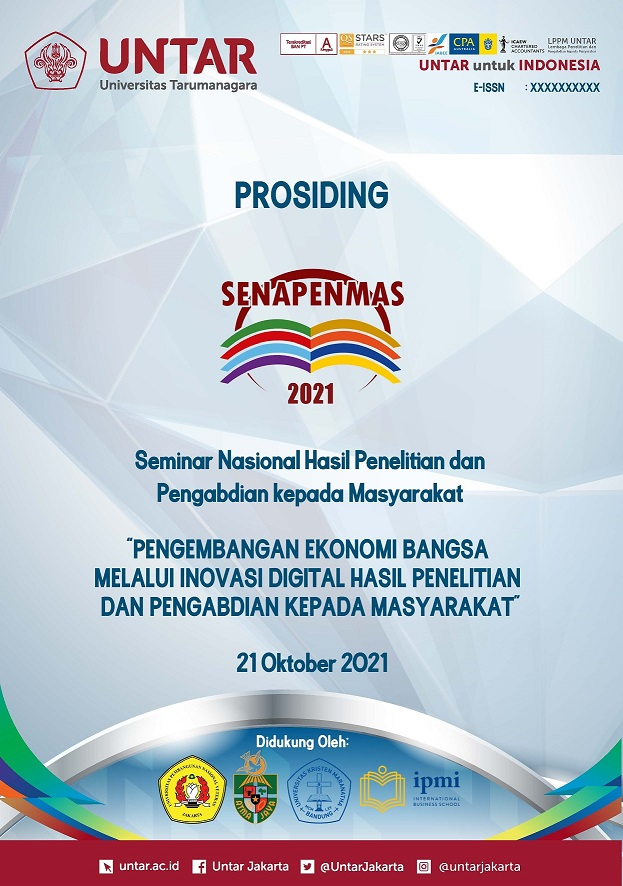PENGARUH WORD OF MOUTH TERHADAP KEPERCAYAAN KONSUMEN DALAM BERBELANJA SECARA ONLINE
Main Article Content
Abstract
This study wants to describe the marketing communication strategy widely used today, namely word of mouth where this form of communication purely relies on the ability of consumers to hear and convey messages or news through conversation. Through word of mouth, consumers can feel a more personal relationship with the company. The word-of-mouth communication strategy is considered quite capable in building consumer confidence in shopping, especially shopping online. This research took a sample of 100 respondents in Bandung City who actively visit the marketplace and make purchases at least twice a month. The results showed that there was an effect of word of mouth on consumer confidence of 0.263 or 26.3 percent.
Penelitian ini ingin menggambarkan mengenai strategi komunikasi pemasaran banyak digunakan pada masa sekarang yaitu word of mouth dimana bentuk komunikasi ini secara murni mengandalkan kemampuan konsumen dalam mendengar dan menyampaikan pesan atau berita melalui percakapan. Melalui word of mouth, konsumen dapat merasakan hubungan yang lebih pribadi dengan perusahaan. Strategi komunikasi word of mouth dinilai cukup mampu membangun kepercayaan konsumen dalam berbelanja, khususnya belanja online. Penelitian ini mengambil sampel 100 responden masyarakat di Kota Bandung yang secara aktif mengunjungi marketplace dan melakukan pembelian minimal dua kali dalam sebulan. Hasil penelitian menunjukkan bahwa terdapat pengaruh word of mouth terhadap kepercayaan konsumen sebesar 0,263 atau 26,3 persen.
Article Details
References
Abubakar, AM. & Ilkan, M. (2016). “Impact of Online WOM on Destination Trust and Intention to Travel: A Medical Tourism Perspective”. Journal of Destination Marketing and Management, 5 (3), 192-201. https://doi.org/10.1016/j.jdmm.2015.12.005.
Bae, S. & Lee, T. (2010). “Gender Differences in Consumers’ Perception of Online Consumer Reviews”. Electronic Commerce Research, 11(2), 201–214. DOI:10.1007/s10660-010-9072-y.
Ganguly, B., Dash, SB., Cyr, D., Head, M. (2010). “The effects of website design on purchase intention in online shopping: The mediating role of trust and the moderating role of culture”. International Journal of Electronic Business, 8(4/5), 302-330. DOI: 10.1504/IJEB.2010.035289.
Giese, JL. & Cote, JA. (2002). “Defining Consumer Satisfaction”. Academy of Marketing Science Review, Vol. 2000 (1). http://www.amsreview.org/articles/giese01-2000.pdf
Goyette, I., Ricard, L., Bergeron, J., Marticotte, F. (2010). “e-WOM Scale: Word-of-Mouth Measurement Scale for e-Services Context”. Canadian Journal of Administrative Sciences 27: 5–23. Published online in Wiley Interscience (www.interscience.wiley.com). DOI: 10.1002/CJAS.129.
IPrice. (2018). Peta e-commerce Indonesia. Diambil 20 Agustus 2021 dari https://iprice.co.id/insights/mapofecommerce/.
Kotler, P. & Keller, KL. (2013). Manajemen Pemasaran Edisi 13 Jilid 2. Penerbit Erlangga.
Norhermaya, YA. & Soesanto, H. (2016). “Analisis Pengaruh Kepuasan Pelanggan Terhadap Kepercayaan Dan Loyalitas Pelanggan Untuk Meningkatkan Minat Beli Ulang (Studi Pada Online Store Lazada.Co. Id)”. Diponegoro Journal of Management, 5(3), 1-13.
Oliviera, T., Alhinho, M., Rita, P., Dhillon, G. (2017). “Modelling and Testing Consumer Trust Dimensions in E-Commerce”. Computer in Human Behavior, 71(June). 153-164. https://doi.org/10.1016/j.chb.2017.01.050.
Peter, JP. & Olson, JC. (2010). Consumer Behavior & Marketing Startegy 9th ed. McGrawa-Hill/ Irwin.
Toruan, RRML. (2018). “Proses Implementasi Word ff Mouth dalam Strategi Komunikasi Pemasaran La Perla Plaza Senayan”. Jurnal Pustaka Komunikasi, Vol. 1, No. 1, 155 – 166.
Wu, MSF. (2017). “A Study on the Effects of Word-of-Mouth on Brand Trust in Tourism Industry”. EURASIA Journal of Mathematics, Science and Technology Education, 13(12), 7995-8002. DOI: 10.12973/ejmste/77904.


